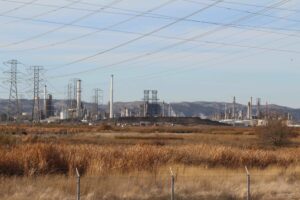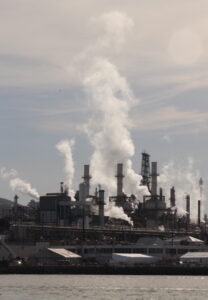Despite a series of dramatic red flag warnings about public safety and climate impacts, compounded by errors in governance, California authorities continue to push hard for completing the conversion of refineries in the San Francisco Bay Area to operate as the largest liquid biofuel manufacturing facilities in the world.
Starting in the summer of 2020, in the wake of the demand destruction of the pandemic slow down, two of five refineries in the SF Bay Area have pursued ‘repurposing’ to manufacture ‘drop in’ diesel and aviation fuels from high deforestation risk commodities like animal tallow and soy.
The two refinery conversion projects are the Marathon biofuels joint venture with Neste at the Marathon Martinez refinery and the Phillips 66 biofuel project at the Rodeo refinery, both on the shores of San Francisco Bay. Though there are subtle differences between the two refineries, both would be operating with nearly identical fossil gas and hydrogen intensive refining processes for manufacturing liquid biofuels.

The Marathon Martinez biofuels refinery is located on the edge of the San Francisco Bay Delta in Contra Costa County and was the site of a serious fire in November 2023.
Both biofuel refineries have been subject to litigation due to their irregular and inadequate environmental review, but it was the Marathon Martinez refinery that was thrust into the public view when fires broke out in November, including one very serious fire incident that resulted in an injured worker being helicoptered off the refinery grounds to the burn center at UC Davis. Concerns around this fire were extensive enough that an investigation of the incident and of the conditions at the refinery has been initiated by the US Chemical Safety Board.
Safety concerns with refining biofuels have been central to community stakeholder and independent expert engagement on the environmental review processes for both the Marathon and Phillips 66 refinery conversion projects since the beginning of public participation. As things have progressed, concerns have only mounted. During the summer and fall of 2023 the local independent consultancy Community Energy Re-Source had shared with Biofuelwatch and other community stakeholders alarming findings based on data from flaring reports from the Marathon Martinez biofuels facility that had been submitted to and recorded by the local Bay Area Air Quality Management District. The data is clear that flaring was occurring at an exceptionally high rate at the refinery that in January 2023 had started up operations for making ‘renewable diesel’ from lipid feedstocks like animal tallow and soy.
The fire at the Marathon Martinez biofuel refinery, as tragically unfortunate as it is, was also an incident that was predicted by informed and experienced local advocates — but the permitting authorities with Contra Costa County, responsible for local land use decision making and acting as the lead agency on the California Environmental Quality Act (CEQA) review of the refinery conversions, have continued to ignore community concerns and stonewall robust public participation in the environmental review of the projects.
As an example of how the County has tried to minimize these public safety issues, when the November incidents at the Marathon Martinez refinery erupted, the County was in the process of taking public comment on the court ordered Draft Revised Environmental Impact Report (Draft REIR) of the Phillips 66 project. The court had ordered a revision of the original 2022 environmental review as an outcome of year long litigation by Communities for a Better Environment and the Center for Biological Diversity challenging the approval of the CEQA review by the County. After a year of briefing and a series of court hearings, the Court ruled in August 2023 that the CEQA review of the Phillips 66 project was seriously flawed, due to illegal piece mealing of the project and the failure to do adequate cumulative impact analysis.
The Court ordered that the previous Final EIR be decertified, and that a Revised EIR for the Phillips 66 project be circulated for public comment, which happened in late October 2023. Immediately after the November 2023 fire at the Marathon facility local stakeholders began requesting of County staff an extension in the public comment period on the Draft REIR for the Phillips 66 project, arguing that, because of the extensive similarities between the projects, the information from the investigation of the root causes of the Marathon Martinez biofuel refinery fire would be relevant to the quality of the environmental review of the Phillips 66 project.
These requests for an extension in public comment were not frivolous. Community Energy Re-Source articulated to the County that a California Public Records Act request made to the Contra Costa County Hazard Materials Programs regarding the Marathon Martinez November refinery fire would not be completed until Dec 21, nearly two weeks after the close of the Phillips 66 comment period.
The request was made to the County to extend the public comment period to insure that the findings from the investigations by all relevant authorities of what happened at the Marathon Martinez biofuel project could be integrated into the review of the Phillips 66 project. For Biofuelwatch, this logic is impeccable.
These requests for an extension of the public comment period on the Phillips 66 project fell on deaf ears. Apparently the issues of public safety and the clear indication that this is a matter of heightened public interest are not sufficient for County regulators to try to get as much information as possible before advancing the refinery conversion project. The County denied all requests for an extension of the recent Phillips 66 public comment period, diminishing the seriousness of the court ruling that the original CEQA review was deficient, callously playing down community concerns after the dramatic emergency at the Marathon Martinez biofuel refinery, and offering hollow assurances that public safety is of utmost concern, and thus, in the eyes of the County, no extension of the public comment period to wait crucial information regarding the recent refinery accident was necessary.
Despite the lack of time, and the rushed nature of the public comment period, Biofuelwatch did offer comment on the Draft REIR of the Phillips 66 project before the December 8, 2023 deadline, as did many other community stakeholders and independent experts.

The Phillips 66 refinery in Rodeo has been getting lucrative incentives for making biofuels even though the environmental review of the project was found deficient by a judge.
Another dynamic that is indicative of the backwards governance of these refinery conversion issues is related to how the California Air Resources Board (CARB) is facilitating the awarding of lucrative Low Carbon Fuel Standard (LCFS) incentive credits for these biofuel refineries, even with their irregular CEQA reviews and ongoing litigation. One of the incongruent dynamics around the governance of the Phillips 66 biofuel refinery project is how CARB awarded Phillips 66 LCFS credits for making ‘renewable diesel’ in December 2021 — while the original environmental review was still in draft form.
Again, now in December 2023, despite the obvious problems with the environmental review of the biofuel refinery project, and in the context of the court order prohibiting the actual operation of the biofuel project until the CEQA process is legally complete, CARB is again preparing to lavishly award Phillips 66 lucrative LCFS credits for making ‘renewable diesel’ — this time with high deforestation risk soy oil sourced from Argentina and brought to the San Francisco Bay Area by tanker.
Local authorities have still done nothing to evaluate what the repercussions would be of a large scale industrial spill of vegetable oil or animal tallow in the Bay. Nor have state authorities taken seriously the abundant evidence exposing the climate damage arising from crop-based biofuels. Biofuelwatch did provide comment to CARB opposing the approval of the current Phillips 66 application for LCFS credits from making liquid biofuels from soy imported from Argentina.
As the governance irregularities continue to pile up around the conversion of SF Bay Area refineries to making liquid biofuels Biofuelwatch will continue to work with partners to highlight the red flags that should at the very least put the brakes on these problematic energy projects receiving incentives from California markets-based climate policy mechanisms like the Low Carbon Fuel Standard.
Whether it be court orders, refinery fires or evidence about soy-based biofuels as a driver of global deforestation, the red flags about the public risks and environmental threats of these biofuel refinery projects are increasingly easy to see — for those who have their eyes open to see them. Unfortunately, state and local authorities in California are trending towards a ‘heads-in-the-sand’ approach to the evidence about public safety concerns and environmental problems with the aggressive pivot to biofuels in the California refinery sector. Agency representatives and elected officials alike are dismissing informed community concerns about the refinery conversions and the resultant predictable threats to the local environment, public health and community safety — as well as ignoring the risks to global forests and the climate.
Contact Biofuelwatch Americas Program Coordinator Gary Hughes at garyhughes.bfw@gmail.com for more information.
